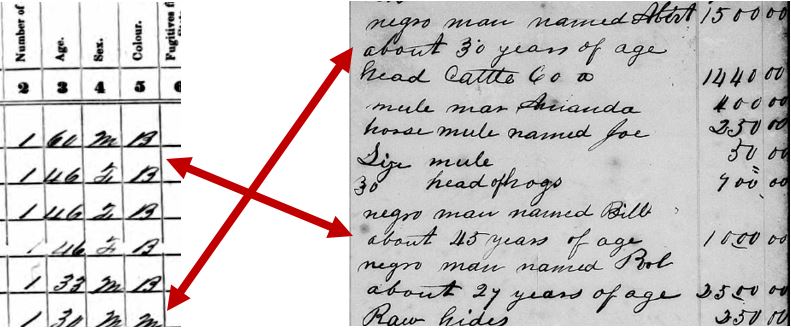The identification of enslaved persons (EPs), sufficient for family research, requires you to analyze an entire group simultaneously. You’ll be comparing censuses against wills against probate inventories to narrow down the options until you have a solid case that you know the name, age, and other details about each one. It’s tough work, but incredibly rewarding as the details emerge.
If you descend from the slaveholder (SH), you have a solid research case. You know that your work is going to lead to something of value. With each success, you have a fuller picture of your ancestor’s world. It might take months, but you only have to do it once.
What if you don’t do it? Or what if you do it and keep your research out of public view? If you leave it to the descendants of your ancestor’s EPs to each find their own ancestor’s story, how will this work?
Let’s make a guess about how many descendants of your ancestor’s forty-two EPs now live on planet earth. A very conservative guess would say there are at least 200,000–and possibly double that. One estimate that 2.5% of the population does genealogical research would mean 5,000 of the descendants are searching for their ancestors. (See “How Popular is Genealogy?”)
Each will take their family back as far as they can, likely hitting a brick wall of formidable proportions around 1865. Even if their enslaved ancestor took the name of his former owner after the Civil War, there might be ten plantations with that name in the likely county. And each plantation might have had fifty men, women, and children — nameless in the slave censuses.
Absent your efforts, your African American colleagues will have to go plantation by plantation, doing many months of group work, processing an entire plantation’s documentation to find one person or maybe no one. It will take years — possibly with nothing to show for it at the end of the search. Imagine the discouragement.
And 5,000 people will be doing this same exercise on speculation — multiplying the needless effort.
Or you, descendant of SHs, can do it once for all, post your work and the 5,000 can quite rapidly determine whether there is a reason to spend time studying your ancestors. You allow them to rule your ancestor out and turn their energy to the next plantation on the list.
If, on the other hand, they find that your ancestors did hold theirs, you have made information available not only about your family, but about the other EPs who shared their ancestor’s world. Your group work will create a large Beyond Kin network for the descendants — a network that will allow them to build something upon your work.
You can do this work once for all, do it with excellence, and save years of wasted time for others. You are the most sensible one to put in the effort. And as they find you, they will be able to add to your knowledge — filling in even further your own family’s story.
The reasons-you-should menu
- Descendant of slaveowners, do you still hold the key?
- The records of slaveholders
- The group approach to slave identification
- The rest of the family picture
- The challenge and opportunity of a lifetime
- If you don’t have slaveholding ancestors
Sign up to receive notices of new developments in the project. We will not share your email address outside our team.


